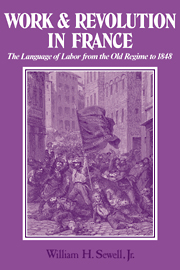Book contents
- Frontmatter
- Contents
- Preface
- 1 INTRODUCTION: SOCIAL HISTORY AND THE LANGUAGE OF LABOR
- 2 MECHANICAL ARTS AND THE CORPORATE IDIOM
- 3 JOURNEYMEN'S BROTHERHOODS
- 4 THE ABOLITION OF PRIVILEGE
- 5 FROM GENS DE MÉTIER TO SANS-CULOTTES
- 6 A REVOLUTION IN PROPERTY
- 7 INDUSTRIAL SOCIETY
- 8 WORKERS' CORPORATIONS
- 9 THE JULY REVOLUTION AND THE EMERGENCE OF CLASS CONSCIOUSNESS
- 10 THE PARADOXES OF LABOR
- 11 THE REVOLUTION OF 1848
- 12 CONCLUSION: THE DIALECTIC OF REVOLUTION
- Notes
- Bibliography
- Index
3 - JOURNEYMEN'S BROTHERHOODS
Published online by Cambridge University Press: 06 November 2009
- Frontmatter
- Contents
- Preface
- 1 INTRODUCTION: SOCIAL HISTORY AND THE LANGUAGE OF LABOR
- 2 MECHANICAL ARTS AND THE CORPORATE IDIOM
- 3 JOURNEYMEN'S BROTHERHOODS
- 4 THE ABOLITION OF PRIVILEGE
- 5 FROM GENS DE MÉTIER TO SANS-CULOTTES
- 6 A REVOLUTION IN PROPERTY
- 7 INDUSTRIAL SOCIETY
- 8 WORKERS' CORPORATIONS
- 9 THE JULY REVOLUTION AND THE EMERGENCE OF CLASS CONSCIOUSNESS
- 10 THE PARADOXES OF LABOR
- 11 THE REVOLUTION OF 1848
- 12 CONCLUSION: THE DIALECTIC OF REVOLUTION
- Notes
- Bibliography
- Index
Summary
THE FLEXIBILITY of the corporate idiom is nowhere more apparent than in the clandestine brotherhoods constructed by journeymen in the sixteenth, seventeenth, and eighteenth centuries. As noted earlier, the place of journeymen in corporations was ambiguous and troubling. Juridical doctrine of the old regime cast relations between masters and journeymen in terms of paternal authority and filial obedience, but this juridical idiom fit badly with the lived experience of seventeenth - and eighteenth-century gens de metiers, particularly in trades that engaged predominantly in manufacture. In essentially commercial trades - tavernkeeping, grain selling, or shopkeeping of all kinds - the labor force was very small, and masters rarely had more than one apprentice or journeyman, who would usually lodge with the master. But in manufacturing trades - shoemaking, masonry, barrel making, baking, hat making, printing, carpentry, and the like- masters generally employed a larger labor force; indeed, there were usually considerably more journeymen in these trades than masters. Under these circumstances, the period spent as a journeyman was typically quite long; many journeymen never attained masterships; journeymen tended to move from employer to employer and from city to city as conditions in the labor market dictated; only a minority of journeymen lived with their masters; and many older journeymen married and had families of their own. In short, journeymen lived quite independent lives, and they developed a sense of their own interests as distinct from, and often in conflict with, the interests of masters. From today's vantage point, relations between masters and journeymen in the manufacturing trades of the old regime appear to be more like class relations than relations of paternal authority and filial subordination.
- Type
- Chapter
- Information
- Work and Revolution in FranceThe Language of Labor from the Old Regime to 1848, pp. 40 - 61Publisher: Cambridge University PressPrint publication year: 1980
- 1
- Cited by



